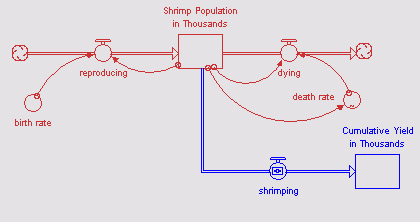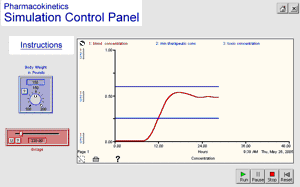|
Education and research are most exciting when they move out of the lecture hall and library and provide opportunity to create, experience, and see. STELLA® offers a practical way to dynamically visualize and communicate how complex systems and ideas really work.
Whether they are first-time or experienced modelers, teachers, students, and researchers use STELLA to explore and answer endless questions like:
- How does climate change influence an ecosystem over time?
- Would Hamlet’s fate have changed if he’d killed Claudius earlier?
- How do oil prices respond to shocks in supply and/or demand?
- What will happen when the ozone layer is gone?
- How do basic macroeconomic principles affect income and consumption?
 The Gold Standard The Gold Standard
Easy-to-use, STELLA models provide endless opportunities to explore by asking "what if," and watching what happens, inspiring the exciting ah-ha moments of learning.
Thousands of educators and researchers have made STELLA the gold standard; using it to study everything from economics to physics, literature to calculus, chemistry to public policy. K-12, college, and research communities have all recognized STELLA’s unique ability to stimulate learning.
Shared Learning
You know that your students have learned when they can, in turn, explain. STELLA models allow you to communicate how a system works – what goes in, how the system is impacted, what are the outcomes.
STELLA supports diverse learning styles with a wide range of storytelling features. Diagrams, charts, and animation help visual learners discover relationships between variables in an equation. Verbal learners might surround visual models with words or attach documents to explain the impact of a new environmental policy.
Use STELLA to:
- Simulate a system over time
- Jump the gap between theory and the real world
- Enable students to creatively change systems
- Teach students to look for relationships
- Clearly communicate system inputs and outputs and demonstrate outcomes
Key Features
Mapping and Modeling
 Intuitive icon-based graphical interface simplifies model building Intuitive icon-based graphical interface simplifies model building - Stock and Flow diagrams support the common language of Systems Thinking and provide insight into how systems work
- Enhanced stock types enable discreet and continuous processes with support for queues, ovens, and enhanced conveyors
- Model equations are automatically generated and made accessible beneath the model layer
- Built-in functions facilitate mathematical, statistical, and logical operations
- Arrays simply represent repeated model structure
- Sub-models support hierarchical model structures
Simulation and Analysis
- Simulations "run" systems over time
- Sensitivity analysis reveals key leverage points and optimal conditions
- Partial model simulations focus analysis on specific sectors of the model
- Results presented as graphs, tables, animations, QuickTime movies, and files
Communication
- Flight simulators and dashboards describe model components and facilitate manipulation
- Input devices include knobs, sliders, switches, and buttons
- Output devices highlight outcomes with warning flashers, text, graphs, tables, and reports
- Storytelling supports step-by-step model unveiling
- Sketchable graphs allow easy comparison of expected results with actual simulations
- Save as Runtime option creates full-screen, runtime models
- Multimedia support triggers graphics, movies, sounds, and text messages based on model conditions
- Model security features allow locking or password protection
System Requirements
Windows Minimum:
- Pentium-class processor
- Microsoft Windows™ 95/98/NT/2000/XP (English Version)
- 32 MB RAM
- 35 MB hard disk space
- VGA display of at least 256 colors
- QuickTime (optional)
Macintosh Minimum:
- PowerPC
- Mac OS 8.6 or better (English Version)
- 64 MB RAM (16 MB available to the program)
- 35 MB hard disk space
- 256 colors
- QuickTime (optional)
|









